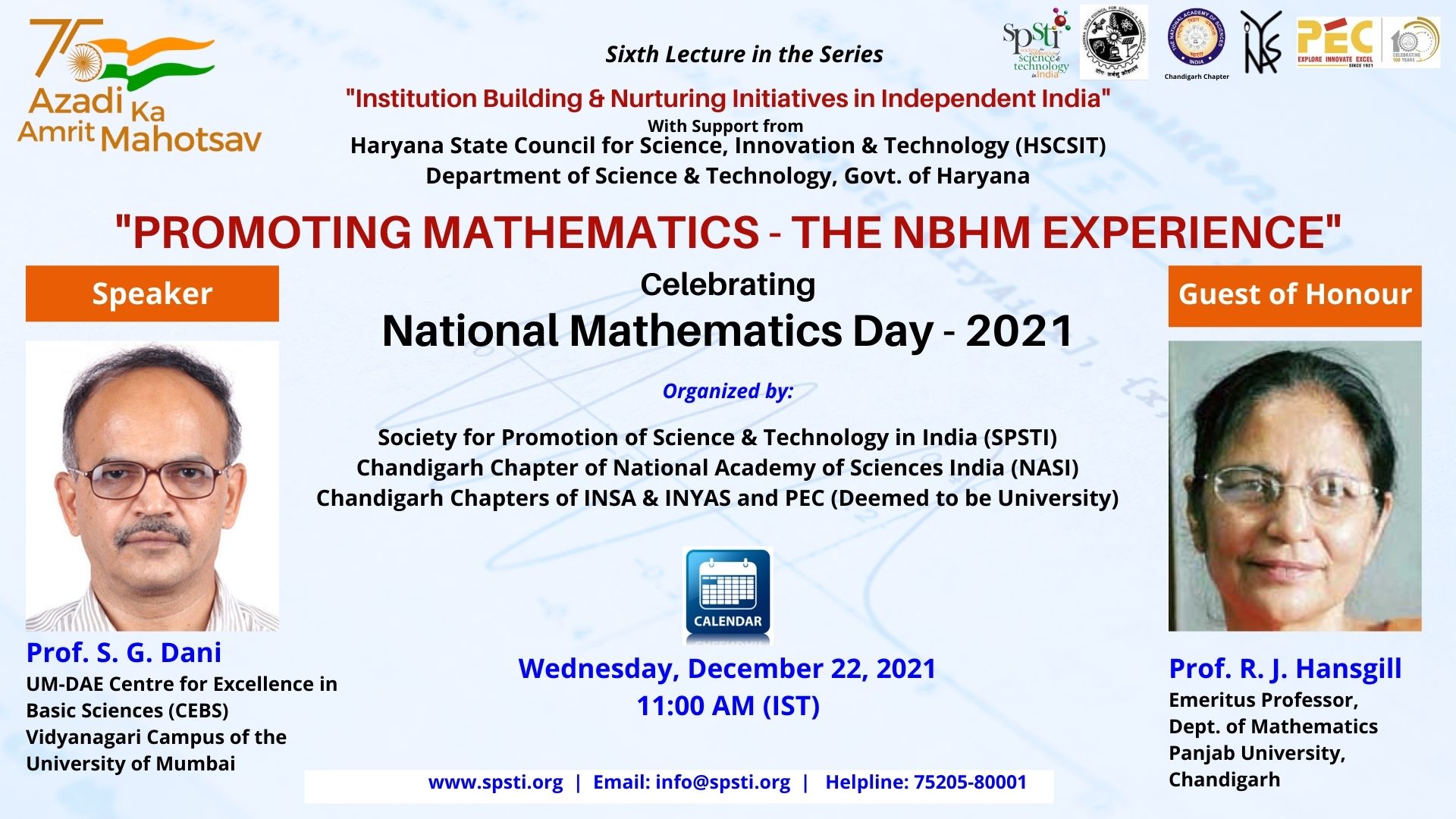The Society for Promotion of Science of Science & Technology in India (SPSTI), with Chandigarh Chapter of the National Academy of Sciences India (NASI) and Chandigarh chapters of INSA & INYAS in association with Punjab Engineering College (PEC) (Deemed to be University),Chandigarh with support from Haryana State Council for Science, Innovation & Technology (HSCSIT), DST, Govt. of Haryana on 135thbirth anniversary of Srinivasan Ramanujan declared as National Mathematics Day organised the sixth lecture of the Eighteen part Lecture series devoted to ‘Institution Building & Nurturing Initiative in Independent India’ to commemorate Azadi ka Amrut Mahotsava. The lecture entitled“Promoting Mathematics – the NBHM Experience” was delivered by Prof. S. G. Dani, UM-DAE Centre for Excellence in Basic Sciences (CEBS), Vidyanagari Campus of the University of Mumbaion December 22, 2021 at 11.00 am through online mode. The lecture aimed to review the experience and its impact on the national scenario. The session was attended online on zoom and many more viewed the same on the Facebook page of SPSTI.
The session was steered by Prof. KeyaDharamvir, General Secretary, SPSTI and conducted by Ms. Rajni Bhalla. The opening remarks were given by Shri Dharam Vir, IAS (Retd.), the President of SPSTI. Prof. Arun Kumar Grover, Former Vice Chancellor of Panjab University and Vice President of SPSTI gave brief introduction about the series. Prof. Sudesh Kaur Khanduja, who is Emeritus Professor at Department of Mathematics, Panjab University, Chandigarhintroduced the Guest of Honour,Prof. R. J. Hansgill, Emeritus Professor, Department of Mathematics, Panjab University, Chandigarh.
ThespeakerProf. S. G. Daniwas introduced by Prof. Riddhi Shah, JNU, Delhi. Prof. S. G. Dani is Professor of mathematics at UM-DAE Centre for Excellence in Basic Sciences (CEBS), Vidyanagari Campus of the University of Mumbai. He was awarded S. S. Bhatnagar award in 1990 and also received the World Academy of Sciences prize in 2007.He shared theNational Board for Higher Mathematics (NBHM) was set up by theDepartment of Atomic Energy in 1983 to foster the development of higher mathematics in India as an autonomous body. He talked about the structure of NBHM with Prof. M. S. Narsimhan as the first Chairman and Prof. M. S. Raghunathan served as Chair during 1987 to 2006. The policies and programmes of NBHM were formulated with the objectives of promoting excellence and raising the general standards in practice of mathematics at various levels. He elaborated on the various activities being carried out by NBHM. He shared efforts for coordinating the activity and generating a framework selection of a team to represent India to a International Mathematics Olympiad began around 1987, when M.S. Raghunathan took over as Chairman of NBHM and process was evolved for selection of team of students. The Olympiad cell coordinate the work and International Mathematical Olympiad Training Camp along with variety of activities such as teacher training camos to raise the potential of the candidates. He shared India has done reasonably well with ranking of 7 in 1999 and 2002 when India 3 gold & 3 silver and 2 gold, 2 silver and 2 bronze respectively. Mentioning girls’participation, he shared till now 6 girls have won silver and 4 bronze medals. He said the main aim should be to develop an enlightened approach to mathematics as students are becoming more inclined to pursue mathematics and take up related careers.
He further discussed about the programmes for undergraduates, namely Mathematics Training and Talent Search (MTTS), Nurture Programme linked with the Olympiads and Madhava Mathematical Competition. The MTTS was conceived in 1992 as a supplementary training programme which aimed to address the fact that the mathematics education imparted at colleges tends to be not very insipid, and even the better need to be conveyed mathematical ideas in more well-thought out ways. The Nurture programme caters to students selected for the IMOTC, provide scholarships to students who opt for Basic Sciences and Mathematics. The Madhava Mathematics Competition was started as an analogue to Olympiad at school level to test and inspire students’ aptitude. NBHM also provides scholarships for graduate studies in mathematics in the country to students pursuing MSc, PhD and post-doctoral. NBHM also provide library support to more than 100 libraries in the country for acquisition of Mathematics books and journals, which is also available to person outside the institution. Book distribution scheme is also operated by NBHM where books of broad interest are distributed including reprint of classic books and promoting publication of books. The board also provides support for research projects, workshops, lectures, advanced training schools and also feature ‘panorama lecture’ to encourage broad based learning of the topic and mathematics in general. The support is alsoproviding support to organise and participate in national and international conferences. The board has also endeavoured to increase the women participation with inclusion of at least one woman mathematician as a member and played important role in genesis of Indian Women in Mathematics.
There are also various centres being supported by NBHM like Chennai Mathematical Institute which was founded in 1989 and became an autonomous institution in 1996 and is being supported by funding through NBHM. He said it is high time that CMI is turned into an institution with direct Government funding. The board also provided support to Kerala School of Mathematics, Institute of Mathematics and Applications and BhaskaracharyaPratishthana. He shared apart from participating in International Olympiad, NBHM has also hosted 37th International Mathematics Olympiad in 1996 and International Congress of Mathematics in 2010 which was held at Hyderabad.He concluded the lecture stating it is difficult to measure the impact but there is no doubt that it has made great difference to awareness and interest in mathematics in the country.
The session was much appreciated by the audience and followed with questions. Prof. KeyaDharamvir, General Secretary, SPSTI presented the vote of thanks. The information about future lectures in the series will be available on the SPSTI webpage and lectures can be accessed on the SPSTI Facebook page.

